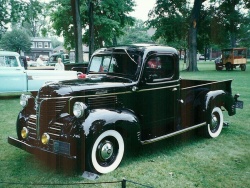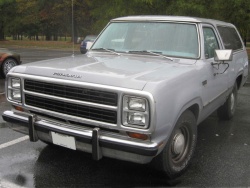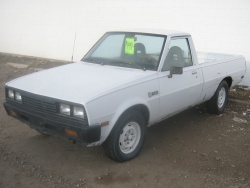 1941 Plymouth truck. Click image to enlarge |
Article and photo by Bill Vance
Ask the average person to describe the now departed Plymouth marque and chances are the answer would be that it was a sturdy and reliable car, although not always exciting. It’s unlikely that anyone would associate Plymouth with commercial vehicles so it may come as a surprise that the Plymouth badge has appeared on a variety of trucks over the years, some of which were sold in the United States market only.
Plymouth dates back to 1928 when a young Chrysler Corporation introduced the four-cylinder Plymouth as a low priced competitor for Chevrolet and Ford. It was so successful that by the early 1930s it had helped Chrysler become, along with Ford and General Motors, one of the American Big Three automakers.
Although Chrysler was already producing Dodge trucks – another 1928 addition – it decided to add a Plymouth commercial type vehicle in 1930. It was a regular two-door sedan that could be converted for hauling chores by removing the rear seat and blanking out the windows. Only 80 Commercial Sedans were produced before Chrysler discontinued it in 1931.
Plymouth stayed out of the commercial field for four years, but began to creep back into it in 1935, again with its car-based, dual-purpose Commercial Sedan powered by Chrysler’s side-valve, six cylinder engine. It was much like the 1930 concept with a panel truck-like, single side-hinged cargo door at the rear. The seats were removable and the side windows could be blanked out. For 1936 Plymouth made the Commercial Sedan a genuine sedan delivery with a dedicated body.
In 1937 the Plymouth sedan delivery was joined by a true pickup truck, although the cab was based on the sedan as was common practice at that time. The Plymouth pickup was just a clone of the Dodge but it did give Chrysler-Plymouth dealers a truck to sell. The Fargo truck, discontinued in the U.S. in 1935, filled the same role for Chrysler-Plymouth dealers in Canada.
  Top: Plymouth Trailduster, photo by Wikipedia user IFCAR); Dodge Ram D50 (Plymouth Arrow), photo by dave_7. Click image to enlarge |
The Plymouth car was restyled for 1939, at which point the car and truck lines diverged. Rather than a car-based cab, the 1939 Plymouth and Dodge pickups had a distinctive rugged appearance with the cab moved forward on the chassis for more cargo space. The 1941 models were the last Plymouth pickups and sedan deliveries built before the Second World War ended automobile production in 1942. Plymouth would not return to trucks for 33 years.
When Plymouth re-entered the truck market in 1974 it was with the U.S. only Trail Duster four-wheel drive sport utility vehicle, and the forward control Plymouth passenger van. As in the past, they were clones of Dodge models, and neither made a very large impact on the truck market.
In 1979, in response to the rising interest in compact trucks, Plymouth began offering the Arrow pickup truck (there was also a Dodge Ram D50 version) produced by Chrysler’s Asian partner, Mitsubishi. The Mitsubishi-based Plymouth Arrow compact pickup was offered only until 1982 when it was replaced by the 1983 front-wheel drive Plymouth Scamp car-based pickup using the Plymouth (Horizon) TC3 subcompact coupe as its foundation. There had been a Dodge Rampage version since 1982, based on the Dodge (Omni) O24 coupe. It had sold quite well, which enticed Plymouth to bring out its Scamp rendition. Unfortunately for Plymouth the Scamp proved to be a sales failure and was discontinued after just one year.
That seemed to be the end of the line for Plymouth trucks. It had always played second fiddle to Dodge, with the main reason for its existence being to balance dealer offerings. Dodge truck had a more rugged, working vehicle image while Plymouth seemed hardly serious about its commercial aspirations.
Plymouth would, however, have one last fling at trucks, although only the government recognized them as such. And it would be its most successful one ever.
Chrysler Corporation introduced its extremely popular front-wheel drive minivans, the Dodge Caravan and Plymouth Voyager “Magic Wagons,” in 1984. They were technically classed as trucks but this is not the way the public perceived them. Although there was a commercial panel truck version, the overwhelming use was as passenger vehicles.
Plymouth Voyager and its Dodge Caravan clone made the minivan wildly popular. It was the kind of station wagon-sedan-truck combination that filled the average family’s hauling needs admirably. The Voyager/Caravan went a long way toward saving Chrysler Corporation, and in the process spawned a myriad of imitators.
So Plymouth’s last excursion into the truck market was by far its most successful, even though it wasn’t really regarded as a truck at all. Perhaps that’s fitting, because most people don’t associate the Plymouth name with trucks anyway.







 Follow Autos on Twitter
Follow Autos on Twitter
